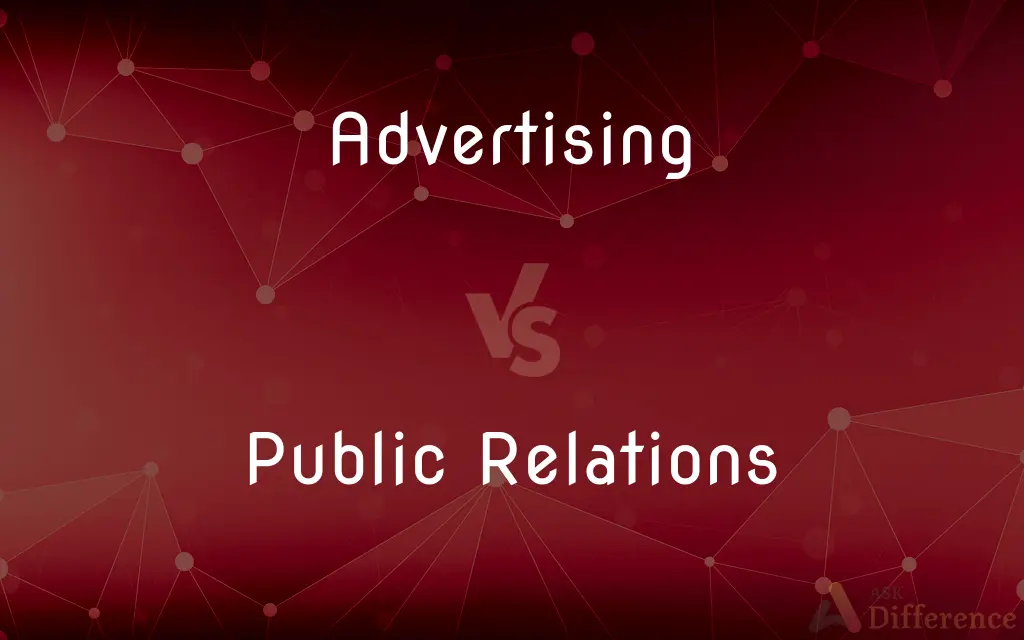Advertising vs. Public Relations — What's the Difference?
Edited by Tayyaba Rehman — By Fiza Rafique — Published on December 17, 2023
Advertising is paid promotion in various media, while Public Relations focuses on managing a brand's image and relationship with the public without direct payment.

Difference Between Advertising and Public Relations
Table of Contents
ADVERTISEMENT
Key Differences
Advertising refers to the direct promotion of products, services, or ideas to a target audience through various media channels. This method often involves purchasing space or time in these channels. In contrast, Public Relations (PR) revolves around influencing, engaging, and building a relationship with key stakeholders to shape a brand's reputation and public image.
Advertising's main goal is often sales-driven; businesses aim to increase product awareness and drive consumers to make purchases. The messages conveyed through Advertising are controlled entirely by the brand or company, ensuring the desired portrayal. On the other hand, Public Relations seeks to create and maintain a positive image for a brand or individual. PR might manage crisis situations, liaise with media, or orchestrate events to generate favorable media coverage.
In Advertising, the brand knows precisely when and where the message will be displayed because they've paid for that specific placement. With Public Relations, there is no guaranteed placement. PR professionals work to earn media coverage, but the final story is controlled by independent media.
Advertising campaigns typically have a clear start and end date, focusing on promoting a specific product, service, or message. Public Relations is an ongoing effort, continuously working to nurture a brand's image and relationships with its audience, stakeholders, and the media.
Comparison Chart
Primary Goal
Promote products/services for sales
Manage and maintain a positive brand image
ADVERTISEMENT
Control Over Message
Total control as it's paid
Limited control as it relies on earned media
Duration
Has a defined campaign period
Ongoing efforts without specific end dates
Payment
Paid media placements
Not directly paid for media coverage
Nature of Content
Direct and promotional
Often more subtle and informational
Compare with Definitions
Advertising
The paid promotion of products or services.
The company increased its Advertising budget to boost sales.
Public Relations
Strategies and activities that influence public perception.
The company focused on Public Relations to improve its standing in the community.
Advertising
Commercial content aiming to increase product awareness.
Without proper Advertising, many products go unnoticed by potential customers.
Public Relations
The practice of managing the spread of information between a brand and the public.
Their Public Relations team handled the crisis exceptionally well, preventing major damage to their reputation.
Advertising
The act of presenting goods or services to the public for sale.
Their new Advertising campaign was both innovative and engaging.
Public Relations
Engaging with media and stakeholders to shape public opinion.
Public Relations plays a crucial role in managing how brands are perceived.
Advertising
Using media channels to market a brand's offerings.
Digital Advertising has taken precedence in the modern age due to its vast reach.
Public Relations
Building and maintaining a positive image for an organization.
Effective Public Relations can often mitigate the effects of negative press.
Advertising
A tool to communicate a brand's message to its target audience.
Effective Advertising can greatly influence consumer choices.
Public Relations
Managing communication between an organization and its audiences.
With good Public Relations, the company was able to navigate through challenging times.
Advertising
The activity of attracting public attention to a product or business, as by paid announcements in the print, broadcast, or electronic media.
Public Relations
Public relations in attributive use
Advertising
The business of designing and writing advertisements.
Advertising
Advertisements considered as a group
This paper takes no advertising.
Advertising
Communication whose purpose is to influence potential customers about products and services.
Advertising
The industry or profession made up of such communications.
Advertising
Present participle of advertise
Advertising
A communication publicly promoting some product or service.
Advertising
The business of advertising; the activity engaged in by professional publicists for pay.
Advertising
A public promotion of some product or service
Advertising
The business of drawing public attention to goods and services
Common Curiosities
Can a company rely solely on Public Relations without Advertising?
While possible, most companies use a mix of both Advertising and Public Relations to achieve varied objectives.
What's the main objective of Advertising?
The main objective of Advertising is to promote products or services, often with the goal of driving sales.
How can Public Relations benefit a company during a crisis?
Public Relations can help manage information flow, shape narratives, and rebuild a brand's image during or after a crisis.
Are press releases a part of Advertising or Public Relations?
Press releases are a part of Public Relations, aiming to provide information to the media and stakeholders.
Is Public Relations always positive for a brand?
Public Relations aims to be positive, but outcomes depend on various factors, including public perception and media interpretation.
Which is more cost-effective: Advertising or Public Relations?
It varies. While Advertising has direct costs, Public Relations can be cost-effective in building long-term brand reputation. However, PR outcomes are less predictable.
Can social media be used for both Advertising and Public Relations?
Yes, social media can host paid ads (Advertising) and also be a platform for brand storytelling and engagement (Public Relations).
How does Public Relations differ in content control compared to Advertising?
In Advertising, brands have total control over the message since they pay for the placement. In Public Relations, the control is limited as it depends on earned media coverage.
Why do companies need both Advertising and Public Relations?
While Advertising directly promotes products/services, Public Relations builds and maintains a brand's overall image and reputation.
Do brands have a say in Public Relations media coverage?
Brands can pitch stories or information, but they don't have direct control over how independent media will present them.
Does Advertising always guarantee sales?
No, Advertising increases awareness and can influence sales, but many factors determine actual sales outcomes.
What's a key challenge in Public Relations?
A key challenge in Public Relations is navigating unpredictable public reactions and media interpretations.
Which has a longer-term focus: Advertising or Public Relations?
Public Relations generally has a longer-term focus, building and maintaining brand reputation over time.
Can Public Relations influence product sales like Advertising?
Yes, positive Public Relations can enhance brand perception, indirectly influencing consumers to choose a brand or product.
Can an Advertising campaign fix a damaged brand reputation?
While Advertising can promote positive aspects, deep-rooted reputation issues often require comprehensive Public Relations strategies.
Share Your Discovery

Previous Comparison
Linear Data Structure vs. Non-linear Data Structure
Next Comparison
Active Diffusion vs. Passive DiffusionAuthor Spotlight
Written by
Fiza RafiqueFiza Rafique is a skilled content writer at AskDifference.com, where she meticulously refines and enhances written pieces. Drawing from her vast editorial expertise, Fiza ensures clarity, accuracy, and precision in every article. Passionate about language, she continually seeks to elevate the quality of content for readers worldwide.
Edited by
Tayyaba RehmanTayyaba Rehman is a distinguished writer, currently serving as a primary contributor to askdifference.com. As a researcher in semantics and etymology, Tayyaba's passion for the complexity of languages and their distinctions has found a perfect home on the platform. Tayyaba delves into the intricacies of language, distinguishing between commonly confused words and phrases, thereby providing clarity for readers worldwide.












































